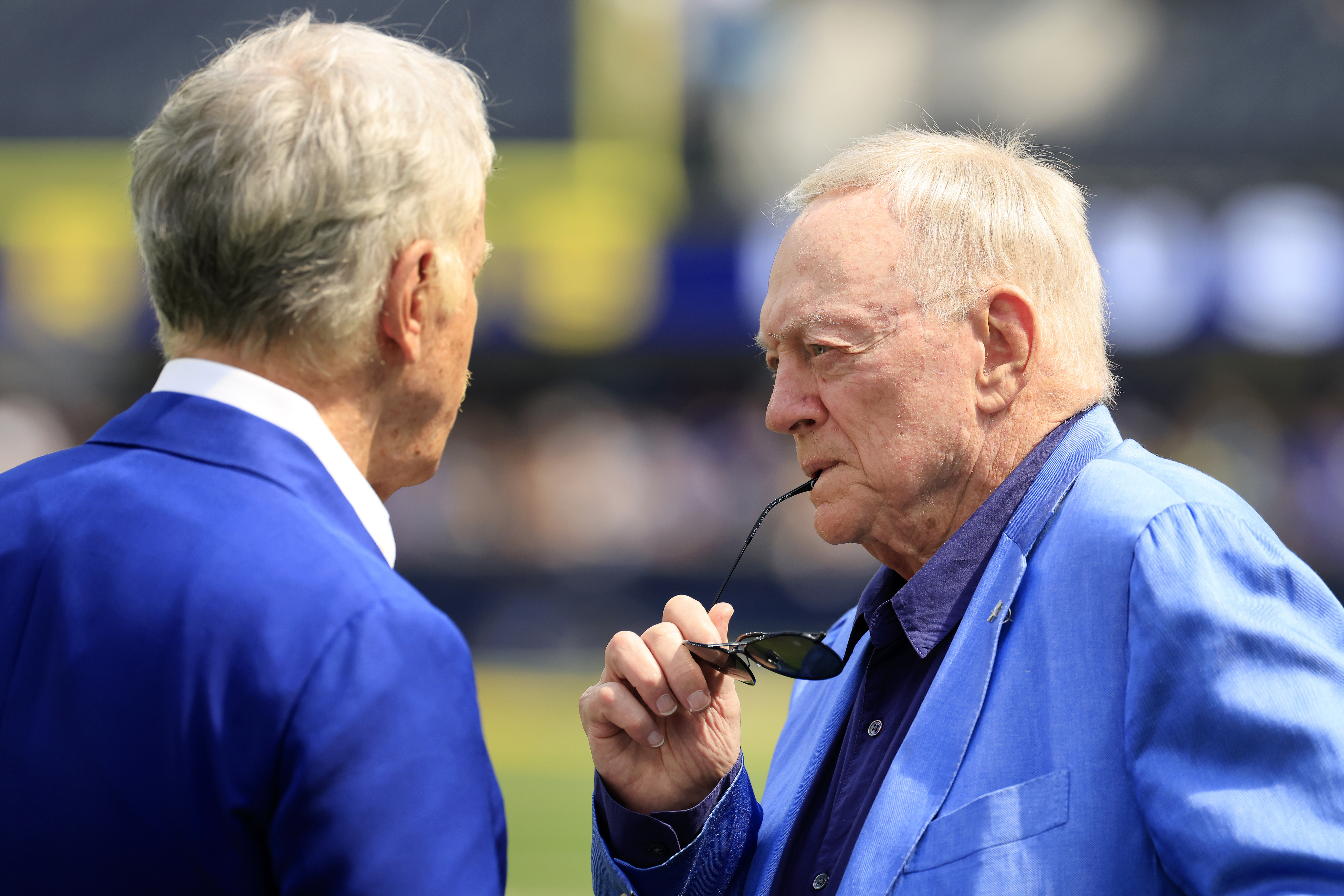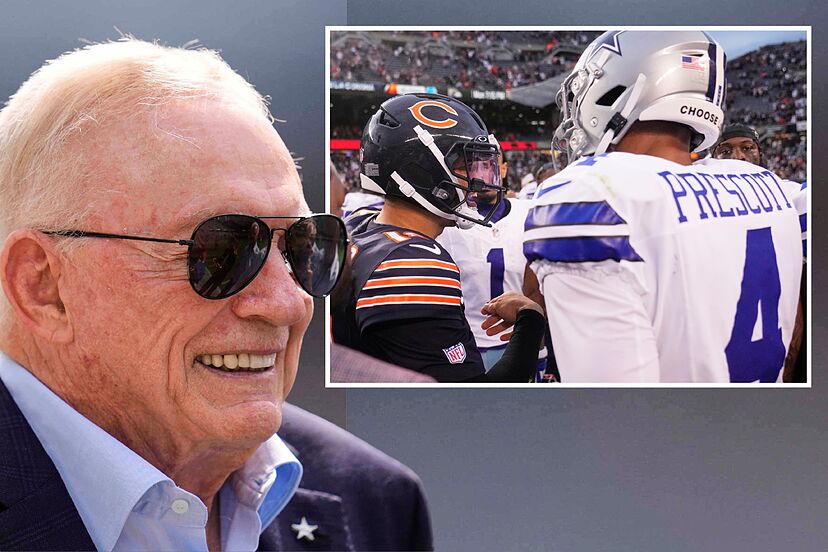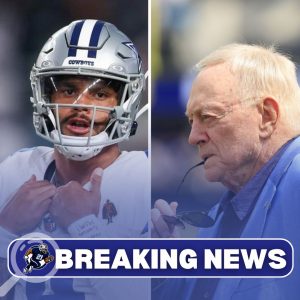Dak Prescott Navigates the Storm: Cowboys Fans, Jerry Jones, and Leadership in Turbulent Times
DALLAS — Dallas Cowboys quarterback Dak Prescott finds himself in a familiar yet delicate position this week: balancing the expectations of a passionate fanbase with loyalty to team owner Jerry Jones. Following a controversial quote from Jones that sparked immediate backlash among fans frustrated with the team’s struggles, Prescott addressed the situation with poise, empathy, and a steady hand. His comments demonstrated a careful calibration between defending his owner’s reputation and acknowledging the valid frustrations of the Cowboys’ supporters.
The Controversial Comment That Ignited the Fire

The controversy originated from a Wall Street Journal article in which Jerry Jones, the team’s legendary owner and longtime executive, was quoted discussing a natural gas venture. Jones said:
“There’s $100 billion present value with gas out there. That’s why I’m talking to you on the telephone rather than trying to fix our defense with the Dallas Cowboys.”
The remark landed like a bombshell in Cowboys Nation. Sitting at a disappointing 3-4-1 record with a defense ranked near the bottom of the league, fans were already on edge, desperate for evidence that the front office was prioritizing immediate roster improvements. Jones’s comment, whether tongue-in-cheek or taken out of context, was interpreted by many as an indication that the owner’s focus was elsewhere—a momentary pivot toward business opportunities instead of the struggles on the field.
Social media erupted within minutes. Fans flooded platforms with messages of frustration, disappointment, and disbelief:
-
“$100 billion? What about fixing our defense first?”
-
“This is why we’re losing games. The owner’s mind isn’t here.”
-
“Dak, help us understand. Are we just another side project?”
The narrative quickly became less about the economics of natural gas and more about the perceived optics of an owner prioritizing business ventures over the immediate needs of the team.
Prescott’s Diplomatic Response
When asked to comment on the backlash, Dak Prescott approached the situation with measured diplomacy. Recognizing the passion and emotional investment of Cowboys fans, Prescott first validated their concerns.
“Being a fan and you just hear that or read that, yeah, of course,” Prescott said. “Especially, right, as many fans are and do — thankful that they do — live and breathe by this team… So yeah, that can definitely be frustrating.”
In a league where public figures often default to clichés or dismissive statements, Prescott’s acknowledgment of the fanbase’s frustration was a notable act of empathy. He understood that the fans’ reactions were not arbitrary but rather rooted in genuine concern over the team’s trajectory and performance. By validating these feelings, Prescott signaled that he was in tune with the larger context beyond the locker room, maintaining trust and credibility with the supporters who invest so heavily in the franchise emotionally—and financially.
Framing the Context: Defending Jerry Jones

After acknowledging fan frustration, Prescott pivoted to defend Jerry Jones, offering a nuanced perspective that reframed the quote in the broader context of the owner’s character and priorities.
“The guy has never really lied about who he is or what he’s trying to do,” Prescott explained.
“Maybe in those five minutes is what he was alluding to, and having a chance at a $100 billion opportunity I think you might take five minutes as well to answer a call. So, hopefully that’s what he means, right?”
Here, Prescott demonstrated the delicate art of contextualization. He didn’t excuse or dismiss the words; rather, he provided a lens through which they could be interpreted as part of Jones’s broader identity as a businessman. By framing the quote as a fleeting moment in which Jones attended to an enormous business opportunity, Prescott reminded fans that the owner’s actions—while sometimes subject to misinterpretation—are rooted in decades of professional experience, success, and strategic thinking.
Leadership on Display
Prescott’s handling of the controversy exemplifies a form of leadership that transcends athletic ability. In his comments, he managed to:
-
Acknowledge Fans’ Concerns: Validating fan frustration shows emotional intelligence and a respect for those who support the team.
-
Defend Leadership Without Defensiveness: Prescott offered context to Jones’s remarks without appearing sycophantic or dismissive, maintaining credibility with both fans and media.
-
Focus on What the Team Can Control: Prescott concluded with a reminder of the players’ sphere of influence:
“For us as players, we can control what we can control. That doesn’t pertain to us right now.”
By steering attention back to the field and what the team can tangibly influence, Prescott avoided letting external noise derail the locker room or distract teammates from the game plan. This is a critical trait for quarterbacks, particularly those in high-profile situations where public scrutiny can be relentless.
Cowboys Fans’ Perspective
While Prescott struck a careful balance, it’s important to understand why the fan reaction was so intense. The Cowboys have endured mediocre performances and defensive lapses in recent seasons, leaving supporters eager for a visible commitment from the organization to win immediately. In that context, Jones’s comment about a $100 billion gas opportunity was interpreted not as a casual remark but as a symbolic moment highlighting misaligned priorities.
Social media sentiment captured a range of perspectives:
-
Critical Fans: Focused on the optics of Jones’s statement, worried the team’s struggles were not being addressed seriously.
-
Moderate Fans: Sympathetic to Prescott’s framing, recognizing the distinction between an owner’s business and the football operations.
-
Supporters of Jones: Pointing to decades of leadership and team success as evidence that the owner’s priorities are ultimately aligned with long-term competitiveness.
Prescott’s response was tailored to address all three perspectives, striking a tone that was empathetic, explanatory, and forward-looking.
The Challenge of Quarterback Leadership
Being the quarterback of the Dallas Cowboys is a unique position that requires constant management of both on-field performance and off-field optics. Prescott is no stranger to navigating public scrutiny—he has been in Dallas since 2016 and has experienced highs, including playoff runs, as well as lows, including injuries and media pressure.
What sets Prescott apart is his ability to communicate thoughtfully. In situations like this, a quarterback must balance multiple priorities:
-
Protect the Team’s Image: Ensuring that the locker room is not destabilized by external controversies.
-
Maintain Credibility With Fans: Acknowledging the emotional investment of supporters, who often serve as the team’s most passionate ambassadors.
-
Support Leadership: Backing the owner or coaching staff while being honest and transparent enough to maintain integrity and trust.
Prescott’s comments reflect a mastery of these priorities, providing a model for how elite athletes can navigate public controversies without inflaming tensions further.
Contextualizing the Cowboys’ Season
The timing of Jones’s quote added to the intensity of fan reactions. The Cowboys entered the week at 3-4-1, with a defense struggling to contain opponents and a playoff outlook increasingly tenuous. The NFL trade deadline was seen as a critical opportunity to improve the roster, heightening the sensitivity to any perceived lack of focus from ownership.
For Prescott, maintaining morale and focus in the locker room is paramount. He cannot control external commentary, but he can control how he communicates with teammates and the public. By framing Jones’s comment as a minor distraction and emphasizing the players’ domain of control, Prescott ensured that the team’s focus remained on winning football games rather than getting bogged down by external noise.
Media Analysis
Sports media pundits have lauded Prescott’s handling of the situation as a textbook example of athlete diplomacy. Analysts have highlighted several key takeaways:
-
Emotional Intelligence: Recognizing fan frustration demonstrates a deep understanding of the team’s ecosystem.
-
Strategic Framing: Providing context for Jones’s comment without overdefending protects both the player and the owner.
-
Focus on Actionable Goals: Redirecting attention to player-controlled elements ensures the team remains mission-focused.
ESPN analyst Jeremy Fowler noted, “Dak’s comments show he’s not just a quarterback on the field; he’s a quarterback of the fanbase and the locker room. That takes a rare kind of leadership, especially in Dallas, where the spotlight is relentless.”
Lessons in Leadership
Prescott’s approach offers broader lessons in leadership under pressure:
-
Acknowledge Stakeholder Concerns: Fans, employees, or stakeholders all want their voice heard. Validation builds trust.
-
Provide Context: Complex statements or actions can be misunderstood; framing them accurately helps prevent misinterpretation.
-
Stay Mission-Focused: While addressing external noise is necessary, leadership requires maintaining focus on primary objectives.
-
Balance Empathy and Loyalty: Supporting your team or leadership while recognizing legitimate concerns shows integrity and credibility.
In essence, Prescott’s response illustrates a blueprint for public-facing leaders navigating controversial situations: empathize, clarify, redirect.
Looking Ahead
The Dallas Cowboys face critical weeks ahead as they navigate a tough schedule and attempt to stabilize their season. Prescott’s leadership will be pivotal in keeping the team focused, motivated, and cohesive. His ability to respond thoughtfully to controversy enhances his credibility not just with fans but with teammates, coaches, and ownership alike.
For Cowboys Nation, Prescott’s comments offer reassurance. While Jerry Jones may occasionally make headlines for unconventional reasons, the quarterback is signaling that the players remain committed, disciplined, and centered on the mission of winning games.
Conclusion
In the often high-pressure, highly publicized world of NFL leadership, Dak Prescott’s handling of the Jerry Jones controversy is a masterclass in communication and composure. He managed to validate the fans’ frustration, defend his owner’s character, and steer attention back to what truly matters: the team’s performance on the field.
In doing so, Prescott not only protected the locker room from potential distractions but also reminded the public why he is considered one of the league’s most level-headed and effective leaders. As the Cowboys continue their 2025 campaign, Prescott’s ability to navigate turbulent waters may prove just as important as his performance under center.
“For us as players, we can control what we can control. That doesn’t pertain to us right now.” — Dak Prescott
These words encapsulate both his philosophy and the essence of effective leadership: focus, clarity, and a steady hand in the midst of a storm.





